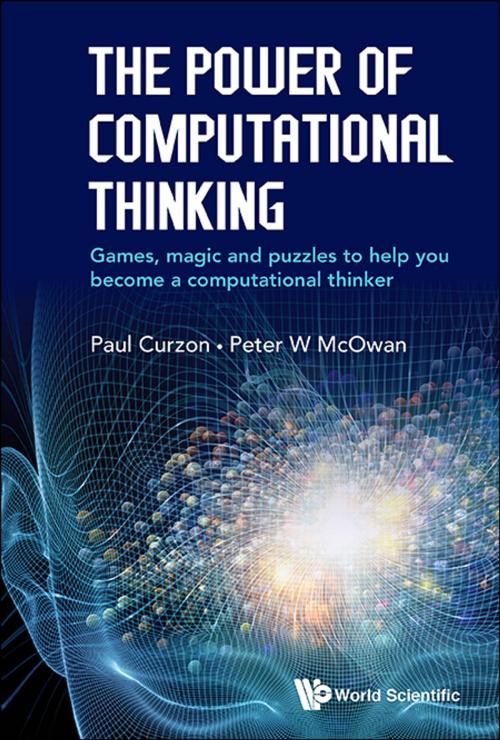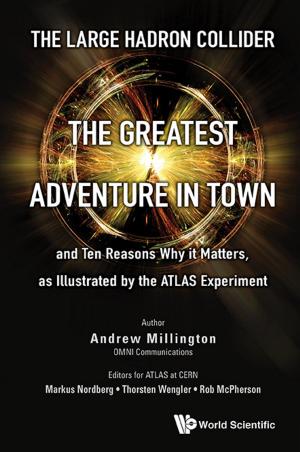The Power of Computational Thinking
Games, Magic and Puzzles to Help You Become a Computational Thinker
Nonfiction, Computers, General Computing, Programming, Kids, Technology| Author: | Paul Curzon, Peter W McOwan | ISBN: | 9781786341860 |
| Publisher: | World Scientific Publishing Company | Publication: | January 17, 2017 |
| Imprint: | WSPC (EUROPE) | Language: | English |
| Author: | Paul Curzon, Peter W McOwan |
| ISBN: | 9781786341860 |
| Publisher: | World Scientific Publishing Company |
| Publication: | January 17, 2017 |
| Imprint: | WSPC (EUROPE) |
| Language: | English |
From the team behind Computer Science for Fun (cs4fn), The Power of Computational Thinking shows that learning to think can be fascinating fun.
- Can you become a computational thinker?
- Can machines have brains?
- Do computers really see and understand the world?
- Can games help us to study nature, save lives and design the future?
- Can you use computational thinking in your everyday activities?
Yes, and this book shows you how.
Computational thinking has changed the way we all live, work and play. It has changed the way science is done too; won wars, created whole new industries and saved lives. It is at the heart of computer programming and is a powerful approach to problem solving, with or without computers. It is so important that many countries now require that primary school children learn the skills.
Professors Paul Curzon and Peter McOwan of Queen Mary University of London have written a unique and enjoyable introduction. They describe the elements of computational thinking — such as algorithmic thinking, decomposition, abstraction and pattern matching — in an entertaining and accessible way, using magic tricks, games and puzzles, as well as through real and challenging problems that computer scientists work on.
This book gives you a head start in learning the skills needed for coding, and will improve your real life problem solving skills. It will help you design and evaluate new technologies, as well as understand both your own brain and the digital world in a deeper way.
Contents:
- Future Thinking
- Searching to Speak
- Magic and Algorithms
- Puzzles, Logic and Patterns
- Puzzling Tours
- Bot Building for Human Beginners
- Build a Brain
- Building a Scam Bot
- Grids, Graphics and Games
- Seeing the Wood and the Trees
- Medical Marvels Inside Out
- Computers vs Your Brain
- So What is Computational Thinking?
Readership: Suitable as a general book for all those interested in lay science or recreational maths, or just interested in learning more about computational thinking; school pupils studying the new programming based national curriculum in computer science, and teachers' upskilling to teach programming. The book may also be useful for first year computer science undergraduate students.
From the team behind Computer Science for Fun (cs4fn), The Power of Computational Thinking shows that learning to think can be fascinating fun.
- Can you become a computational thinker?
- Can machines have brains?
- Do computers really see and understand the world?
- Can games help us to study nature, save lives and design the future?
- Can you use computational thinking in your everyday activities?
Yes, and this book shows you how.
Computational thinking has changed the way we all live, work and play. It has changed the way science is done too; won wars, created whole new industries and saved lives. It is at the heart of computer programming and is a powerful approach to problem solving, with or without computers. It is so important that many countries now require that primary school children learn the skills.
Professors Paul Curzon and Peter McOwan of Queen Mary University of London have written a unique and enjoyable introduction. They describe the elements of computational thinking — such as algorithmic thinking, decomposition, abstraction and pattern matching — in an entertaining and accessible way, using magic tricks, games and puzzles, as well as through real and challenging problems that computer scientists work on.
This book gives you a head start in learning the skills needed for coding, and will improve your real life problem solving skills. It will help you design and evaluate new technologies, as well as understand both your own brain and the digital world in a deeper way.
Contents:
- Future Thinking
- Searching to Speak
- Magic and Algorithms
- Puzzles, Logic and Patterns
- Puzzling Tours
- Bot Building for Human Beginners
- Build a Brain
- Building a Scam Bot
- Grids, Graphics and Games
- Seeing the Wood and the Trees
- Medical Marvels Inside Out
- Computers vs Your Brain
- So What is Computational Thinking?
Readership: Suitable as a general book for all those interested in lay science or recreational maths, or just interested in learning more about computational thinking; school pupils studying the new programming based national curriculum in computer science, and teachers' upskilling to teach programming. The book may also be useful for first year computer science undergraduate students.















